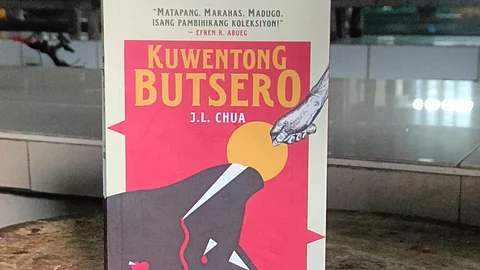
- NEWS
- the EDIT
- COMMENTARY
- BUSINESS
- LIFE
- SHOW
- ACTION
- GLOBAL GOALS
- SNAPS
- DYARYO TIRADA
- MORE

In Kuwentong Butsero, author J.L. Chua takes readers on a visceral journey through 10 Filipino short stories that weave violence, social critique and psychological torment.
On the surface, this book presents gritty, graphic and unapologetic tales of contemporary Filipino life. But underneath its raw exterior lies something deeper: a reflection of a society scarred by neglect, inequality and the quiet prevalence of violence
The title — butsero or “butcher” — reveals a thematic thread of cutting through the lies and illusions that keep the marginalized weak. The characters who are oppressed, abandoned and wounded slowly find strength in their pain. Sometimes they seek revenge; other times, resolution. But always, they reclaim something that was unjustly taken from them.
Each of the stories moves with the same theme: silence is never neutral and violence — though unsettling — can also be a “reasonable” response to a world that no longer listens.
For example, in the story “Katay,” a butcher exploited by a corrupt system that diminishes workers finally finds his voice. In “Dinuguan,” prejudice prevails in a community, resulting in dire consequences. “Suwail,” on the other hand, exposes generational defiance as a form of rebellion.
Stylistically, Chua moves between lyrical passages and blunt, visceral prose. His descriptions of violence are often disturbing, but they never feel gratuitous. Instead, they serve to underline the trauma that his characters endure and how that trauma becomes a source of transformation.
“Yes, Kuwentong Butsero may seem extreme (even nauseating to read), but beneath the surface, the stories unravel deeper truths. We may not physically butcher people, but are we not guilty of cruelty in other ways? Underpaying employees, backstabbing friends, spreading lies, indulging in vanity at the expense of others — these, too, are acts of butchery,” Chua says.
In reader discussions online, many have noted how Kuwentong Butsero captures the “trauma of the times.” I agree with one reviewer who described the book as “brave, bold and unflinching,” a rare collection where the monsters are often not mythical creatures, but the people we live with or meet on a daily basis.
Published in cooperation with Gadgad Press in March 2025 and launched during the Philippine Book Festival, the book is timely in its relevance and fearless in its voice. It speaks to a generation grappling with authoritarianism, environmental collapse, economic instability and cultural erasure. And yet, it never loses hope. Chua’s stories (and the characters) rise in the end.
“Kuwentong Butsero is meant to be engaging, but it’s not for the faint of heart. It belongs to the transgressive genre, much like certain popular Korean and Japanese books translated in English that tackle violence, death, revenge, etc. Literature reflects society, and in our tumultuous times, books like this serve as both a mirror and a warning,” he says.
Indeed, Kuwentong Butsero is a literary wake-up call. It is a reminder that stories can wound and heal at the same time, a testament that victims of abuse can also reclaim their power. In a world filled with injustice and unrest, Kuwentong Butsero emerges as an essential read.
Kuwentong Butsero is available at all Fully Booked branches.
